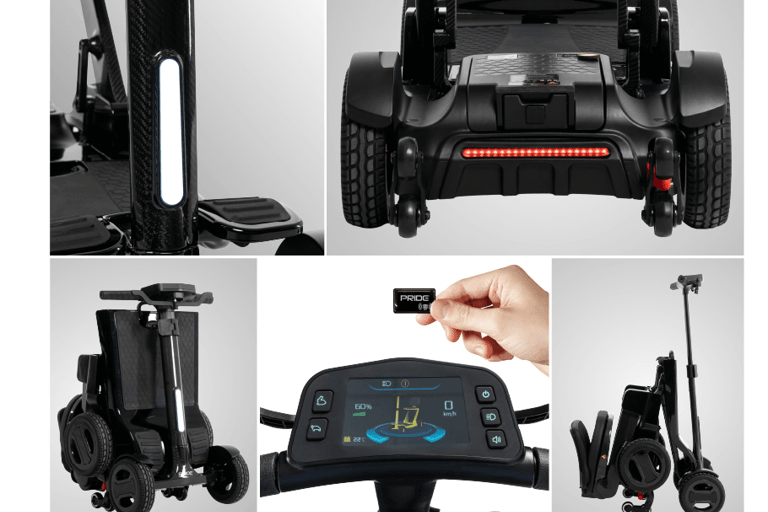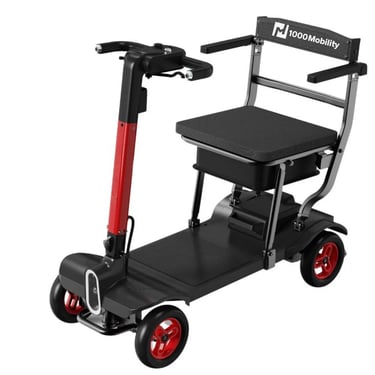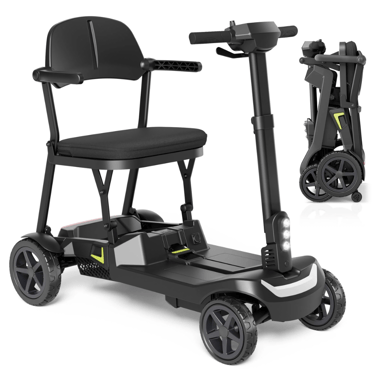Why the Go-Go Carbon Isn’t the Best Choice for Dealers Considering Carbon Fiber Mobility Scooters
8/19/20253 min read
1. Product Positioning vs. Market Demand
The Go-Go Carbon is positioned as a premium, tech-driven scooter built with real carbon fiber and advanced dashboard features. While this makes it attractive in marketing, most senior end-users—the primary buyers in this industry—still prioritize comfort, ease of handling, and affordability over high-tech features.
Dealer consideration: If the majority of your customer base is price-sensitive and values practicality, a carbon fiber scooter that carries a higher cost but limited day-to-day advantages may not generate strong sales volume compared with other lightweight folding mobility scooters.
2. Weight vs. Usability
Go-Go Carbon Weight: ~35 lbs without battery.
While lighter than many steel-frame scooters, lifting 35 lbs of rigid equipment into a car trunk is still not easy for seniors with arthritis, back problems, or limited strength.
Dealer consideration: True portability for seniors usually comes from lightweight folding mobility scooters with tilt-and-roll designs (no lifting required), not just reduced weight. If the product does not actually solve the end-user’s pain point, dealers risk higher return rates and customer dissatisfaction.
3. Material Advantage vs. Cost Effectiveness
Carbon fiber is durable and lightweight, but adds significant cost to manufacturing.
Most users don’t perceive enough difference in day-to-day use compared with steel or aluminum scooters.
Steel and aluminum remain easier to repair, more cost-effective, and more familiar to technicians worldwide.
Dealer consideration: Ask whether the material innovation truly translates into value for the majority of your customers. If not, you may face slower turnover and reduced margins, especially when compared with proven lightweight folding mobility scooters built with steel or aluminum.
4. Target User Segment Limitations
The Go-Go Carbon is best suited for:
Users under 5’10 and <200 lbs
Relatively strong and mobile customers
Frequent travelers seeking sleek design
This excludes a significant portion of the mobility scooter market, which includes larger or less physically capable seniors.
Dealer consideration: A good supplier should provide models covering wider user ranges—including affordable lightweight folding mobility scooters for travelers, heavy-duty users, and comfort-focused buyers.
5. Feature Complexity vs. After-Sales Support
The Go-Go Carbon offers:
NFC ignition (anti-theft)
Smart dashboard with fault codes
Ultra-bright headlights
While advanced, these features also increase dependency on specialized technical support. Dealers must be prepared to handle after-sales training and potential troubleshooting.
Dealer consideration: A supplier must guarantee accessible spare parts, responsive service, and technician support. Otherwise, advanced features become liabilities compared with simpler, lightweight folding mobility scooters that are easier to maintain.
How Dealers Should Select Carbon Fiber Mobility Scooters
When evaluating whether to carry a carbon fiber folding scooter, dealers should focus on:
Market Fit – Does the model address mainstream senior customer pain points (easy handling, comfort, price)?
Weight Practicality – Can the scooter be easily loaded/unloaded by the target users, or does it still require assistance?
Material Value – Does carbon fiber justify its cost compared to proven lightweight folding mobility scooters with steel/aluminum frames?
Product Range – Does the supplier provide complementary models (affordable options, heavy-duty models, traveler-friendly designs)?
After-Sales Support – Are spare parts, manuals, and technical help easily accessible?
Price Competitiveness – Will the dealer maintain healthy margins while offering a product the customer is willing to pay for?
Conclusion for Dealers
The Go-Go Carbon may serve as a niche product for tech-savvy or younger mobility aid users, but it is unlikely to be the best-selling model in a dealer’s lineup.
For most distributors, the smarter strategy is to partner with suppliers offering a balanced portfolio—combining affordable, proven steel-frame scooters with selective carbon fiber options that truly address portability and usability challenges.
👉 1 – Secure Proven Alternatives
If a full carbon fiber scooter isn’t the right fit for your market, consider proven models like the Riley Folding Scooter and the Zippy Folding Scooter. Both are already gaining traction for their balance of affordability, portability, and comfort—fitting mainstream customer needs better than niche carbon-fiber builds.
👉 2 – Act Before Exclusivity Locks You Out
These models may soon become exclusive to certain distributors. Acting now ensures you can secure access before competitors lock in the rights, protecting your position in the market.




Quick Links
Contacts
Phone: +86 159-5204-1008 (WhatsApp/Wechat)
Email: bd@1000mobility.com
Address
NO. 353 Baoshang Avenue, Zhejiang Province, China
Get in touch
© 2025 1000 Mobility. All rights reserved.
